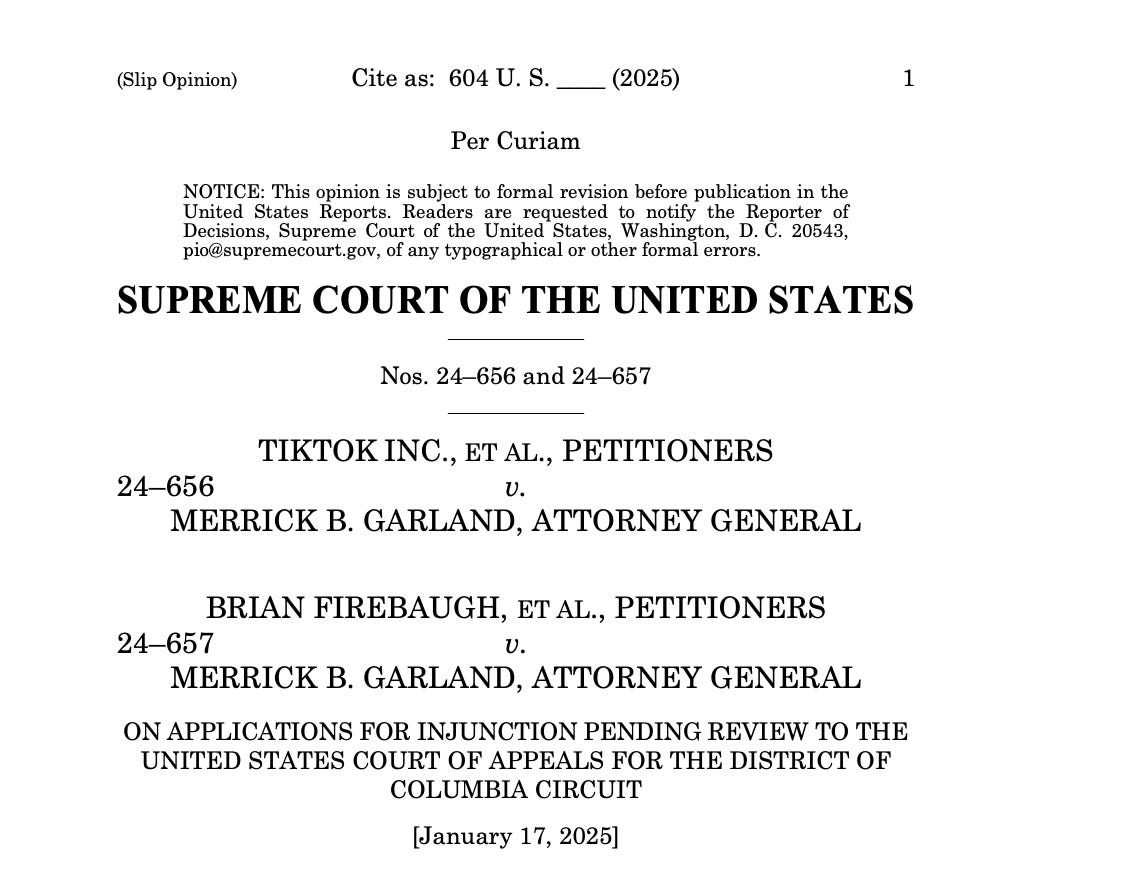TikTok
Leaders in both parties seem to be bowing to the practical reality that 170 million Americans use TikTok. Five million Americans have businesses on the app. After the Supreme Court’s decision this morning upholding the law that would ban TikTok unless its Chinese owners divest by Sunday, there is a scramble to press pause on the ban.
The Supreme Court ruled, “There is no doubt that, for more than 170 million Americans, TikTok offers a distinctive and expansive outlet for expression, means of engagement, and source of community. But Congress has determined that divestiture is necessary to address its well-supported national security concerns regarding TikTok’s data collection practices and relationship with a foreign adversary. For the foregoing reasons, we conclude that the challenged provisions do not violate petitioners’ First Amendment rights.”
The national security concerns are serious. Things work differently in China, where the government is entitled to access information collected by businesses. That means TikTok could be “forced” to turn over all sorts of information about its users, and China could be in a superior position to manipulate American opinion, say, in an election, or even use sensitive data about Americans usage to compromise individuals and coerce them into acting on China’s behalf.
The Supreme Court concluded that the Act does not violate the First Amendment, despite claims by TikTok and its users. The Court “assumed without deciding” that the First Amendment applies to Congress’ decision to regulate a foreign-owned company so that it could get to the heart of the matter and make its decision. It concluded that “the challenged provisions are facially content neutral and are justified by a content neutral rationale.” Because Congress was motivated by natural security concerns and placed restrictions on the ownership of TikTok, but not the content any creator could place on it if owned by a non-offending entity, the Court concluded there is no unconstitutional restriction on speech.
“For the reasons we have explained, requiring divestiture for the purpose of preventing a foreign adversary from accessing the sensitive data of 170 million U. S. TikTok users is not “a subtle means of exercising a content preference.” …The prohibitions, TikTok-specific designation, and divestiture requirement regulate TikTok based on a content-neutral data collection interest. And TikTok has special characteristics—a foreign adversary’s ability to leverage its control over the platform to collect vast amounts of personal data from 170 million U. S. users—that justify this differential treatment. ‘[S]peaker distinctions of this nature are not presumed invalid under the First Amendment.’” The Court evaluated the law using an intermediate level of scrutiny and found that it passed muster.
Donald Trump used to be against TikTok when he was president. But then it played well for him, especially with young white men, during the election. Now he’s for it.
Democratic leaders in Congress who, despite playing a role in passing the measure last year along with Republicans, now seem to be hesitating for pragmatic reasons—their constituents want the app to remain available. President Biden has announced that since the ban goes into effect on Sunday—not a business day—and he leaves office Monday at noon, he would let the Trump Administration pick the path forward. That leaves businesses like the App Store in something of a bind—although fines will apparently not be assessed against them beginning on Sunday, which is what the law calls for, they are in a legal limbo, not knowing how this will play out.
Even if you love the app, the national security concerns should give you pause. “[T]he Government asserts an interest in preventing a foreign adversary from having control over the recommendation algorithm that runs a widely used U. S. communications platform, and from being able to wield that control to alter the content on the platform in an undetectable manner.” I love animal videos as much as the next person, but China is, as Congress has designated it in the Act, a foreign adversary, and national security concerns cannot be ignored. How that plays out in the long run is now in Donald Trump’s hands. Will we see new content suggesting Trump is entitled to a third term in office, despite the Constitutional bar, pushed out by social media algorithms over the next few years?
In a caution about the limited nature of its opinion because of its rushed nature, the Court wrote at the outset, “[W]e are conscious that the cases before us involve new technologies with transformative capabilities. This challenging new context counsels caution on our part. As Justice Frankfurter advised 80 years ago in considering the application of established legal rules to the ‘totally new problems’ raised by the airplane and radio, we should take care not to ‘embarrass the future.’ ..That caution is heightened in these cases, given the expedited time allowed for our consideration. Our analysis must be understood to be narrowly focused in light of these circumstances.” Their self-restraint in this context is laudable. It’s a shame the conservative majority lacked a similar amount of introspection when they decided the presidential immunity case and set the country on the path we are about to embark on. TikTok.
We’re in this together,
Joyce



I hope Musk is not allowed to buy TicTok
“[T]he Government asserts an interest in preventing a foreign adversary from having control over the recommendation algorithm that runs a widely used U. S. communications platform, and from being able to wield that control to alter the content on the platform in an undetectable manner.” Then we should immediately divest Donald Trump and Elon Musk for national security reasons.